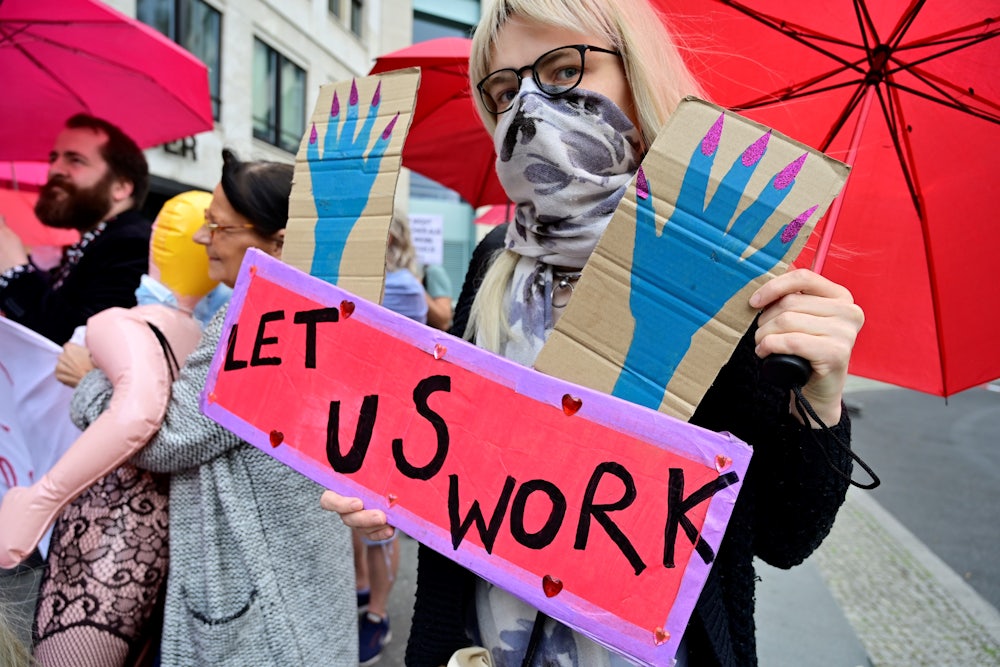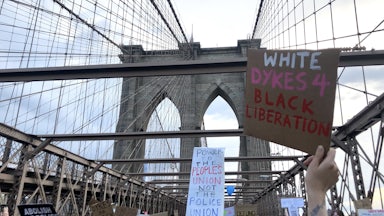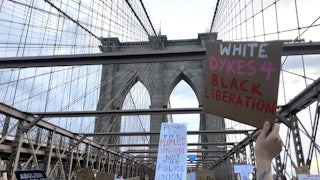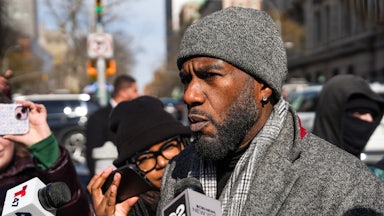The morning after the 2016 election, in a tidy, scenic park along the Hudson River, I met up with Sarah Marchando, a plaintiff in a class action suit against the city of New York alleging constitutional rights violations in the enforcement of anti-prostitution laws. We chose the place because it seemed the police were less likely to bother her there. “It has been to a point where I have come home from Rikers Island and caught a case less than two days later,” she had told me in an interview, describing one of the times she was arrested by the NYPD, who, once, had gone so far as to pull over a city bus she was riding in to charge her with prostitution. When she told me, “I felt like I was being watched,” that was an understatement. The NYPD would go on arresting Black and Latina trans and cis women for prostitution whether or not they were sex workers, based mostly on who they were, what they were wearing, and where in the city they went. Yet the years since have also seen a groundswell of sex worker activism around the country, along with growing support for sex workers’ rights from across the left. The law Marchando and her co-plaintiffs were challenging was at last repealed in February.
The campaign to repeal what had come to be called the “walking while trans” ban was driven by a coalition of trans, immigrant, and Latinx sex workers, including from groups like Make the Road NY and VOCAL, and was backed by a group of state legislators who supported the repeal, and who, like sex workers themselves, saw it as part of a broader set of policy changes to decriminalize sex work. When sex workers say “decriminalization,” what they mean is repealing laws that make it a crime to sell sex, buy sex, loiter to sell or buy sex, and provide a workplace for sex workers. Something was shifting: In one of the most repressive eras, marked not only by Trump but by new federal legislation targeting sex workers, a majority of voters now say they support sex work decriminalization, as polling released in 2020 showed, including nearly two-thirds of Democrats. All this marks a new turn in the movement for sex workers’ rights.
New York state hasn’t fully decriminalized sex work—a bill first introduced in 2019, the Stop Violence in the Sex Trades Act, is back in the current legislative session. As with the DecrimNY campaign launched in support of that bill, this wave of local efforts to repeal anti-prostitution laws is driven by sex workers: In the District of Columbia, a 2019 hearing on a decrim bill backed by a sex worker–led coalition ran for more than 14 hours and with over 200 testimonies. New decrim bills were introduced in February in Massachusetts and Oregon, and a decrim bill will be reintroduced this month in Louisiana.
That may seem uncontroversial. It should seem like a given that lawmakers would consider sex workers to be stakeholders in setting the laws that govern their lives, but for a long time it wasn’t. The shift we’re seeing now is in part because the sex workers’ rights movement in the United States has set that expectation. As one of the members of DecrimNY told me, “I’ve spent 15 years insisting on sex workers being heard at all.” Now, sex workers are being asked: “What do you want us to do about it? How can we help you?”
That it is no longer breaking news that “sex work is work” or that legislators should “listen to sex workers” is a sign of the movement’s success. What comes next is translating those shifts in political messaging into strategy and policy change. For decades, sex workers’ rights advocates have worked without major philanthropic support, without a national policy shop, and its leaders have worked under a double repression: as sex workers and as sex workers’ rights advocates. Most anti–sex work laws are on the state level, and that is where advocates’ efforts are focused now. That’s also where the myriad tensions that come with movements are: between community organizing and lobbying behind closed doors, between those who collect a paycheck for their advocacy and those who—as most sex workers in the U.S. long have—fund their activism with sex work.
The movement is not a monolith, and looks different from state to state. In Massachusetts, for example, the coalition that introduced two bills related to decriminalizing sex work, DecrimMA, grew out of organizing by a group led by sex workers who are drug users, called Whose Corner Is It Anyway, and a prison abolition group led by and for currently and formerly incarcerated LGBTQIA+ people, called Black and Pink Massachusetts. “The only people on our leadership team are sex workers. There are no allies on our leadership team, and that’s very intentional and necessary,” said Naomi Lauren, an organizer with Whose Corner Is It Anyway. “Not only are we 100 percent sex workers, but we are coming from two organizations that are led by and for criminalized populations.” Some sex workers face a fairly low risk of arrest, said Lauren. “And our members face a high risk of arrest for all sorts of things, not just sex work. So we are the major stakeholder population in conversations because we are who is getting arrested now”—under anti-loitering laws, or drug war laws, even anti-trespassing laws. “For us, it’s about all the kinds of criminalization we experience.”
For three and a half years, Whose Corner Is It Anyway, “a mutual-aid, harm-reduction, political education, and organizing group led by stimulant- and opioid-using low-income, survival, or street-based sex workers,” has been meeting weekly in Western Massachusetts. With Covid-19, it has shifted to monthly supply pick-ups for members—syringes, safer smoking kits, Narcan, Covid and cold-weather supplies, pregnancy tests, condoms—with as many as 120 people coming by each month. Its weekly programming covered practical skills like wound care as well as inviting in other sex workers to talk about the history of the movement. Taking on policy work was always the hope, and with building community and leadership, the group’s members have laid the groundwork. Their approach to policy work, including the kinds of arguments they make, is grounded in their specific experience of the sex trade. “It’s not necessary for our members to feel empowered by their work. Work is just something we do,” said Lauren. “The idea that you can and should be empowered by your work has a class location, and it’s not relevant to us. We tend to focus on the material well-being of people in the sex trade.”
In February, DecrimMA helped introduce two decrim bills in the state legislature: SD 2226, “An Act to Stop Profiling Transgender People and Low Income Women,” and HD 2200, “An Act to Promote the Health and Safety of People In the Sex Trade.” The first bill would repeal the parts of the state criminal code that are analogous to the “walking while trans” ban. (Massachusetts refers archaically to sex workers as “Common night walkers, common street walkers, both male and female.”) The second would repeal anti-prostitution laws and provide for the expungement of past records.
DecrimMA expects to face opposition from groups who want to eliminate the sex trade—who have introduced about half-a-dozen bills themselves. Those who support such “end demand” laws—which are also sometimes misleadingly referred to as “decriminalization” but are more accurately described as client criminalization, on the premise that focusing police resources on men who buy sex and not women who sell it will “end demand” for sex work—even may share some of their analysis: that the sex trade is part of a larger economic and social reality in which “economic pressures are racialized,” Lauren said, and as such, the sex trade is racist. “It’s just that ending the sex trade doesn’t solve any of those problems.” But more to the point, those groups tend to include few people, if any, who are currently working in the sex trade, said Lauren. “We are the ones who will face increased client violence and state violence,” should “end demand” laws pass.
End demand groups may say that the laws they want are necessary in order to protect people who are trafficked—and in turn try to blame sex work’s existence for human trafficking, or portray sex workers as at odds with trafficking victims. But decriminalization advocates don’t see themselves as working against victims. “I want to talk about trafficking—I think a lot of sex workers’ rights groups are afraid to talk about it,” said Lauren. “People who want to pass laws that will hurt us often do so in the name of people who are coerced. I think it’s really important to say that the people targeted by abusive third parties in the sex trade are people already in the sex trade, and it is us.” While much of the narrative about end demand may focus on the figure of a woman or girl who is forced into prostitution due to “demand,” the reality is that the people who are already engaged in sex work are more vulnerable to predatory managers and abusive working conditions, to wage theft and sexual assault.
End demand is less concerned with violence people in the sex trades face right now than it is with protecting those seen as more deserving of protection. There are at least three people on the DecrimMA leadership team who have been trafficked, Lauren said. “What is often true is that people who have been trafficked have had consensual experiences, too. We know when we are being raped and when we are not. It’s frustrating to hear people erase us in the interest of advancing their ideology.”
More and more sex workers’ rights advocates are refusing to let people who claim to want to protect them—like much of the mainstream anti-trafficking movement—speak for them. Likewise, their advocacy work is not about defending the existence of sex work, or to function, as Lauren put it, like a “vice industry chamber of commerce,” something led by “class-privileged sex workers, clients, and managers, as a kind of way to promote the industry.” Lauren is against that, she said. “For us, the sex workers’ movement is a labor movement, and as such, managers and clients have no role.” They can write checks, she said, and then they can stay out of the movement work.
In truth, there is very little institutional support in philanthropy for sex workers’ rights—which is one reason why sex worker mutual aid funds have been so vital. The groups who do get funding don’t often get it to do policy work. When the Sex Workers Project, or SWP, received a substantial grant in 2020 from an anonymous donor, not only was it a rarity, it was also perhaps the single largest gift any sex workers’ rights organization in the U.S. had received from an individual donor. The donor, a Portland philanthropist named Aaron Boonshoft, who was unknown in sex workers’ rights work, was interested in supporting a campaign to decriminalize sex work in Oregon.
“Last year was a very hard year for us,” SWP managing director RJ Thompson said. Founded in 2001 in New York, SWP provides legal and social services to people engaged in the sex trades, regardless if that’s by “choice, circumstance, or coercion.” They had laid people off and lost a government grant, he said. The new donor’s grant was transformative. “People are suffering, organizations are suffering, and we have had the most successful year we’ve ever had in terms of growth and service provision and everything.” SWP has now hired a staff person, Mariah Grant, to coordinate the campaign. “There is not an actual coalition, per se,” Thompson said. “Right now, the stage we are at is a lot of relationship-building” with “sex worker rights organizations on the ground.”
What led them to Oregon, given that they are not working in a formalized coalition with local groups and are still working on building local relationships? Thompson said he created a proposal to the donor, who was interested in decriminalization, to go for Oregon, and that they received the grant as a result of his proposal. Thompson said they had also been talking with the group Decriminalize Sex Work, or DSW, a national group launched in 2018 that describes itself as “pursuing a state-by-state strategy to end the prohibition of consensual adult prostitution in the United States,” and whose leadership includes two former SWP staff. In discussions about which states were ripe for a decriminalization campaign, “Oregon kept popping up,” Thompson said. In part, that was because the state had decriminalized the possession of small amounts of all drugs. Already, there was an Oregon-based decriminalization coalition modeled on those in New York and Washington, D.C. “[DSW] were encouraging us to move forward in Oregon.” The Oregon coalition, Decrim Oregon, didn’t have the “capacity, funding, and paid staff,” Thompson said, to mount a statewide campaign for decrim. (An interview request emailed to Decrim Oregon did not receive a response.) In February, a decrim bill backed by SWP, House Bill 3088, was introduced in the Oregon state legislature by Democrat Rob Nosse. SWP’s Mariah Grant said the bill has collected additional co-sponsors, as well.
The relationship between community-based sex workers’ rights groups and national groups (or those, like SWP, seeking to become national) is complex, yet reflects some of the same basic tensions found in other rights movements: over who makes decisions, who gets funding, and who gets results. These kinds of conflicts can also come with increased visibility and support. It played out quite publicly when DSW, a national group, tried to introduce a ballot initiative to decriminalize sex work in Washington, D.C., a move that was opposed by D.C.-based sex workers and their decriminalization coalition, Sex Worker Advocates Coalition, or SWAC, who already had introduced their own decriminalization bill. They accused DSW of trying to “astroturf our local movement,” as SWAC said as part of a statement. DSW was white-led, whereas the D.C. groups were led by people of color. DSW was also co-directed by a former marijuana lobbyist named Rob Kampia, who was accused of sexual misconduct at a marijuana policy organization and called “a serial sexual harasser” by his former chief of staff. More than two dozen sex workers’ rights groups issued a public statement in March 2019 calling for Kampia to resign and for other sex workers’ rights groups to reject Kampia.
In February 2020, when SWAC raised the issue again and The Washington Post reported on it as a sign of “rifts in the nascent sex work movement as it tries to move from the fringe to the mainstream,” DSW withdrew its D.C. ballot initiative. The movement was anything but nascent; the modern movement to decriminalize sex work has been active for nearly 50 years. But it was perhaps the first time that intra-movement debates about racism and sexual harassment were covered for a national audience, and as a policy story.
As these groups gain ground, the diversity of campaign tactics are also becoming more apparent. In Washington, D.C., Black and trans sex workers rooted their bill in challenges to policing and gentrification, and were backed by groups like BYP100 DC and No Justice No Pride. New York sex workers also foregrounded police violence in their campaign, with a significant block of support from trans and Latinx sex workers from communities like Jackson Heights, Queens, who had also helped bring the case of Layleen Polanco, who died in the jail at Rikers Island in 2019, to public attention, calling both for the closure of Rikers and the decriminalization of sex work.
In both Louisiana and Missouri, groups working on reproductive justice and trans rights, respectively, and which include sex workers, have launched campaigns to decriminalize sex work. Women With A Vision, founded in New Orleans in 1989 by Black women in response to HIV/AIDS, came to decrim in part through a campaign to repeal “solicitation of crimes against nature” laws, which led to sex workers having to register as sex offenders. After a multiyear fight, they won, striking one of the most punitive anti–sex work laws in the country. On Wednesday, their decrim bill will be introduced in the Louisiana state legislature, said Christine Breland Lobre, program director at Women With A Vision, led by a new coalition called Decrim Deep South, with “over 100 partner organizations from across the state that have signed on in support of decriminalizing sex work in Louisiana.”
Missouri doesn’t have a decriminalization bill on the horizon, but a new coalition in the state called Mo Ho Justice is working on getting local prosecutors to drop prostitution charges, among other decarceral tactics. The coalition incubated at the state’s American Civil Liberties Union chapter, which supported its report, “State of the Hustle,” for which it surveyed more than 150 sex workers in the state. The funding came through the ACLU, where coalition co-lead Jay-Marie Hill was running a trans justice program. “It wasn’t like we didn’t know what was going on in our community,” said Indigo Hann, also a co-lead in the coalition. “We had already talked to our community, we already exist in community,” she said. “But it comes with a different weight when we have graphs and pretty graphics and the ACLU is co-signing.”
Hann started working with Hill when the St. Louis chapter of the Sex Workers Outreach Project, which Hann ran, couldn’t find a venue for its annual Day to End Violence Against Sex Workers event. So it held it at the ACLU. From that relationship, the coalition was born. It was important for them to center Black and trans sex workers, they both told me. They hired two Black trans people with connections to the sex worker community as research assistants. Sex workers helped develop the survey, Hann said, and other sex workers in the coalition “mobilized their networks” to reach that fairly large number of respondents during the pandemic. The coalition work has a mutual aid component, but they also are working to “enter the political conversation,” in order to press the city and state to turn resources to direct support for sex workers. “Those care networks already exist,” Hill said. “It looks like elevating and resourcing those care networks,” which sex workers have been supporting on their own. “You are directly impacted, and you know what’s best. And—you shouldn’t have to save your own life over and over.”
To look at this kind of organizing, in all these states, it is impossible to say that this is a movement defined by sex-positive feminism, as it once may have been, or only in large cities like New York and San Francisco. In truth, the once more dominant narratives of empowerment don’t have to run counter to anti-racism and labor rights. The more sex workers’ rights are seen as integral to other rights movements—and they are—the more they win.








